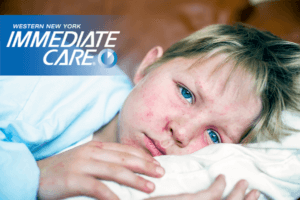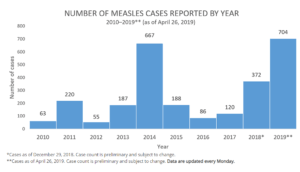
By: Dr. Amirah Brown-Johnson MD, FAAP

Chart courtesy of CDC’s Measles Cases & Outbreaks
With measles outbreaks happening in our region, parents are rightfully concerned, wondering what they can do to better protect their children from contracting this infectious disease. Vaccination is the best way to keep your child and family protected. If you have not yet vaccinated your child, it’s not too late. Talk to your child’s pediatrician right away.
What is measles?
Measles is a serious respiratory disease in the lungs and breathing tubes that causes a rash and fever. It is very contagious. In rare cases, it can be deadly.
At what age should I vaccinate my child?
It is recommended that the measles, mumps and rubella vaccine be given to children at age 12-15 months, and again at 4-6 years.
Doctors recommend that your child get two doses of the MMR shot for best protection. Your child will need one dose at each of the following ages:
How long will my child’s measles vaccine last?
Children who are vaccinated rarely develop measles. However, to increase the effectiveness of the measles vaccine, two doses should be given, which is estimated to give life-long protection.
Is the MMR shot safe?
Yes. The MMR shot is very safe, and it is effective at preventing measles, as well as mumps and rubella. Vaccines, like any medicine, can have side effects. But most children who get the MMR shot have no side effects.
What are the side effects?
Most children do not have any side effects from the shot. The side effects that do occur are usually very mild, such as fever, rash, soreness or swelling where the shot was given, or temporary pain and stiffness in the joints (mostly in teens and adults). More serious side effects are rare. These may include high fever that could cause a seizure.
Is there a link between the MMR shot and autism?
No. Scientists in the U.S. and other countries have carefully studied the MMR shot. No link has been discovered between autism and the MMR shot.
What are the symptoms of measles?
Measles begins with a fever that can reach very high temperatures. Other symptoms that may occur include:
Can measles be serious?
Measles can be dangerous, especially for babies and young children. From 2001-2013, 28 percent of children younger than 5 years old who had measles had to be treated in the hospital. For some children, measles can lead to:
How does measles spread?
Measles spreads when a person infected with the measles virus breathes, coughs or sneezes. It is very contagious. Almost everyone who has not had the MMR shot will get measles if they are exposed to the measles virus. You can catch measles just by being in a room where a person with measles has been up to 2 hours after that person is gone. And, you can catch measles from an infected person even before they have a measles rash.
Where do measles cases in the U.S. come from?
Each year, unvaccinated U.S. residents contract measles while they are abroad and bring the disease into the U.S., spreading it to others. Measles is common in other parts of the world, including countries in Europe, Asia, the Pacific Islands and Africa. Worldwide, about 20 million people get measles each year. When people with measles travel into the U.S., they can spread the disease to unvaccinated people, including children too young to be vaccinated.
How many measles cases are there in the U.S. each year?
From year to year, measles cases can range from roughly less than 100 to a couple hundred. However, in some years, such as 2014, there were more measles cases than usual—667 people from 27 states were reported as having measles. Most of these people got measles in the U.S. after being exposed to someone who got measles while in another country.
This year, we have seen record numbers of increase in measles. According to the CDC, from January 1 to April 26, 2019, 704 individual cases of measles have been confirmed in 22 states. This is an increase of 78 cases from the previous week. This is the greatest number of cases reported in the U.S. since 1994 and since measles was declared eliminated in 2000.
Where can I learn more about the MMR shot?
Talk to your child’s doctor, call 1-800-CDC-INFO or visit www.cdc.gov/vaccines/parents.